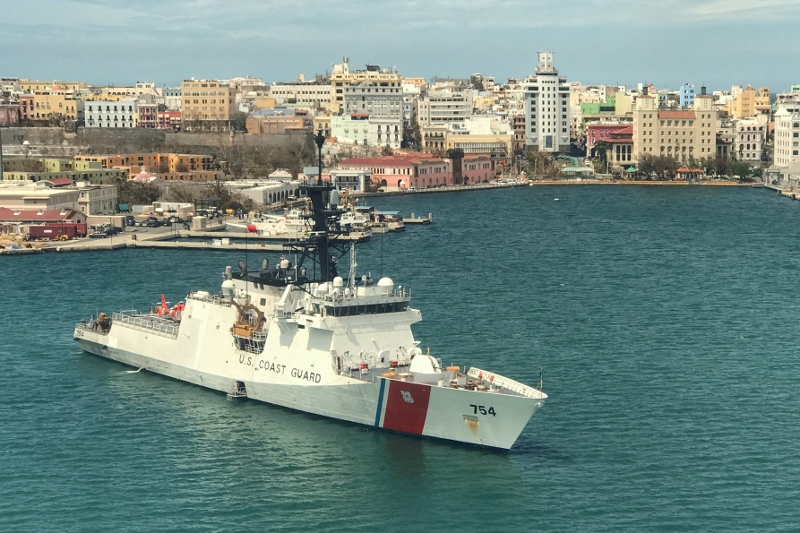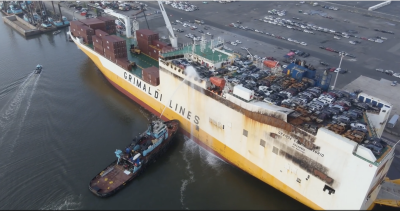Under intense pressure to ramp up Puerto Rico relief efforts, President Trump Thursday morning reversed course and granted a 10-day waiver of the Jones Act to allow foreign flag vessel deliveries of fuel and supplies.
Like two earlier waivers to speed fuel deliveries after hurricanes in Texas and Florida, the measure is a temporary exemption to the Merchant Marine Act of 1920 cabotage rule that cargo between U.S. ports must travel on U.S. flag vessels.
But longtime advocates of Jones Act reform – who teamed up with critics of the administration’s Hurricane Maria response demanding the waiver – clearly see Puerto Rico’s rebuilding needs as an opportunity to push for permanent change.

“Now Congress must repeal this law to aid long-term recovery,” Sen. John McCain, R-AZ, wrote on Twitter shortly after the decision was announced.
McCain and Sen. Mike Lee, R-Utah, said they will introduce a bill to permanently exempt Puerto Rico.
“The Jones Act should not only be waived for Puerto Rico, but this law that cripples our ability to transport goods over water should be repealed by Congress, and the president should take all constitutional avenues toward reducing its crippling effect,” said Adam Brandon of FreedomWorks, a Washington, D.C., free-market advocacy group.
Earlier Trump said the U.S. maritime industry pressed him to maintain the initial Department of Homeland Security decision Monday not to grant a waiver. Customs and Border Protection officials said they determined there was sufficient U.S. flag cargo capacity available to Puerto Rico.
Maritime advocates argued the problem with resupply is not ships, but conditions on the island.
“What we are seeing clearly on the ground is thousands of cargo containers piling up at the port of San Juan, filled with essential goods that the Puerto Rican people desperately need, but not nearly enough trucks and clear roads to distribute the goods,” said Thomas Allegretti, chairman of the American Maritime Partnership, the industry’s pro-Jones Act advocacy group. “So, the problem at the port is a lack of trucks and delivery routes, not a lack of vessels.”
The call in Congress for a waiver was led by Rep. Nydia Velázquez, D-NY, whose New York City district has strong cultural ties to Puerto Rico, joined by others from urban areas with connections to the island.
Like McCain, they have been consistent advocates for changing the Jones Act, contending its requirements for U.S. flag transportation, and tariffs on foreign shippers landing cargo on the island, contribute to higher fuel and food costs, and Puerto Rico’s persistent economic slump.

Puerto Rico Gov. Ricardo Rossello (at podium) announces decision to waive the Jones Act for emergency relief. Office of Gov. Ricardo Rossello.
That pressure was renewed after the waiver denial, and Puerto Rico Gov. Ricardo Rossello personally appealed to Trump. Shortly after 8 a.m. Thomas Bossert, assistant to the President for homeland security, wrote on Twitter that Trump “waived immediately upon request” and that DHS and the Federal Emergency Management Agency sought “seamless fuel delivery” to the island.
The Maritime Labor Alliance pushed back on the premise that non-U.S. vessels are needed to speed the sealift.
"The Jones Act does not prohibit foreign vessels from transporting supplies to Puerto Rico. In fact, nearly two-thirds of the vessels calling in Puerto Rico are foreign flag and nearly all of the fuel transported to Puerto Rico is delivered aboard foreign flag vessels," according to an MLA statement.
"There are currently fifteen U.S.-flag ships and U.S.-flag oceangoing tug/barge combinations regularly serving Puerto Rico. These vessels alone are now bringing in more supplies than can be distributed ashore," said the group, a coalition of six leading maritime labor organizations. "Other U.S. flag commercial vessels are available and over sixty government owned reserve cargo vessels that can be called into action and fully operational with 72 hours."




.png.small.400x400.png)
